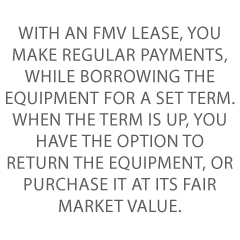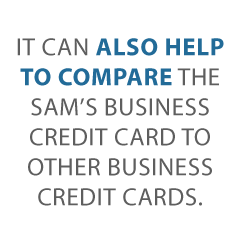
Equipment Financing and Leasing
If You Need to Modernize, Equipment Financing and Leasing Can Make that Much More Affordable
Does your business need equipment? Some of it can be extremely expensive. For a new business in particular, affording equipment can feel like an impossible dream. But you have got to have that equipment to make money! How do you make it past this frustrating Catch-22? You do it with equipment financing and leasing.
What is Equipment Financing and Leasing?
Equipment financing is when you use a loan or lease to purchase or borrow hard assets for your business. It is a business financing option you can use to buy or lease any physical asset. Physical assets can include items such as a restaurant oven or a company car. See nav.com/business-financing-options/equipment-financing.
Why Do Companies Use Equipment Financing and Leasing?
A recent the Equipment Leasing and Finance Association (ELFA) survey found that 80% of American businesses lease a portion of their equipment. The list of companies using leasing ranges, from the Fortune 500 to a mom and pop store. See entrepreneur.com/article/225959.
Advantages
You will pay predictable amounts every month. You can build business credit on a program such as this. The equipment is great collateral, the lender probably will not want any other collateral.
You will often put down less money than you would if you were buying the piece of equipment. You may be able to negotiate flexible terms with an equipment lease. It is easy to upgrade equipment after your lease ends. This is helpful if your equipment is something like a computer which quickly becomes obsolete.
Disadvantages
You may have to pay a large down payment. You will often need to have good personal credit in order to qualify. If your financed equipment becomes outdated, your business is stuck with it until the end of the lease for loan.
Also, leases can often end up costing more than purchasing. When the lease ends, you will need a new lease or to make some other arrangement. Buying a piece equipment means it is yours to keep or to sell.
Demolish your funding problems with 27 killer ways to get cash for your business.
Questions you Should be Asking
What equipment do you need and for how long? Do you want to bundle service, supplies, training, and the equipment lease into one contract? Have you anticipated your company’s future needs so you get adequate equipment? What is the total payment cost?
Important Things You Need to Know About Any Lease
Who will you be dealing with? Is there a separate company financing the lease? How long has the company been in business? Do you understand the terms and conditions during and at the end of the lease?
Is casualty insurance a requirement to cover damage to the equipment included? Who pays the personal property tax? What are the options regarding upgrading and trading in equipment before the lease period expires? Who is responsible for repairs?
Fair Market Value Leasing
Also known as an FMV lease. With an FMV lease, you make regular payments, while borrowing the equipment for a set term. When the term is up, you have the option to return the equipment, or purchase it at its fair market value.
$1 Buyout Leases
This is a type of capital lease. You pay off the cost of the equipment, plus interest, over the course of the lease. In the end, you owe exactly $1.
Once you pay the $1 residual. which is essentially a formality, you fully own the equipment. This type of lease is very similar to a loan in terms of structure and cost.
10% Option Leases
This lease is the same as a $1 lease. But at the end of the term, you have the option to buy the equipment for 10% of its costs. These tend to have lower monthly payments than a $1 buyout lease.
Demolish your funding problems with 27 killer ways to get cash for your business.
How Much Can a Lease Cost?
Here is an example. Let us say you are leasing a $25,000 piece of equipment. Call it a 10% option, and a 36 month term.
The value of the Equipment is$25,000. The interest Rate is 15%. The term Length is 36 months. The monthly Payment is $780. The total Cost of Leasing equals $28,079. And the cost to Purchase is $2,500. Hence the total Cost of Equipment is $30,579. See merchantmaverick.com/equipment-financing.
With the example, you would be paying an extra $5,579 over the course of the lease. That is over 1/5 more added, to your total cost for the equipment.
If you bought the equipment from the start, you would pay $25,000. So you would be in $25,000 in the hole from the beginning. But with leasing, you have not spent the total $25,000 until over 2 ½ years have gone by. In the meantime, you can invest that money or earn interest on it.
Demolish your funding problems with 27 killer ways to get cash for your business.
Did You Know Credit Suite Offers Equipment Financing and Leasing?
We offer equipment financing and leasing programs. Companies must have at least one year in business. You can get approval even with challenged credit. You will not need financials to secure equipment financing. Approvals take as little as 24 hours.
Check out the easy qualification process. You can get approval with as low as a 640 personal credit score. For approval, lenders will request details on the equipment you are getting. After a quick credit review, you can get approval for as much as $10,000,000 in equipment financing.
Equipment leasing is powerful! We help business owners get financing to lease equipment. With equipment leasing you receive even more favorable terms than typical business financing programs, with even more benefits. Whether you are a startup business or a well-established business, we have hundreds of equipment lenders who would like to help.
Equipment Leasing Rates and Payments
You can qualify with only two monthly payments as a down payment. And you can get approval with a credit score as low as 640. Rates are affordable and 100% of your interest is tax deductible. Plus, you can get financing up to $10,000,000.
Benefits
You can enjoy 24-hour pre-approval. And you pay no application fees. Interest is tax deductible. Go all the way from application to funding in 2 weeks or less. Purchase, lease, or borrow against existing equipment.
Heavy equipment financing is available. We have loans for up to $10,000,000. And you can get approval with average credit. The equipment serves as collateral. Note: financials are necessary.
Equipment Financing and Leasing: Takeaways
Businesses often have fluctuating revenue. But they still have to have equipment. And for new businesses, they have to have equipment to get going, but they can never seem to be able to afford it.
This type of funding can be the ideal solution. There are advantages and disadvantages to leasing equipment, just like any other form of lease versus purchase. Credit Suite offers equipment financing and leasing. We help you navigate multiple dissimilar offers and make sense of it all. Let’s take the next step together.
The post Equipment Financing and Leasing appeared first on Credit Suite.


